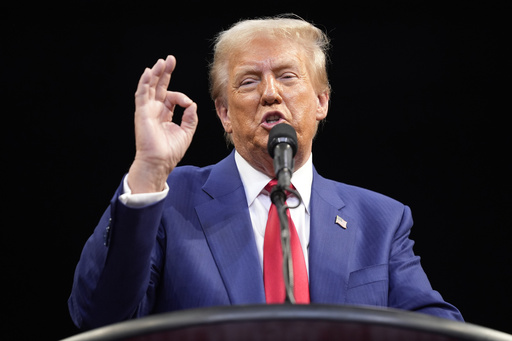
WASHINGTON — The indictment accusing Donald Trump of unlawfully maintaining classified documents was filled with alarming allegations, including claims that he displayed a secret Pentagon attack strategy to individuals at his golf club and instructed his attorney to mislead the FBI regarding the existence of certain White House records. However, these revelations were overshadowed by a ruling from the Trump-appointed judge overseeing the case, who dismissed it on the grounds that the special counsel responsible for the prosecution had been improperly appointed.
Another criminal matter alleging that Trump conspired to overturn the results of the 2020 presidential election once appeared poised for trial this year, focusing on his attempts to cling to power after losing to Democrat Joe Biden. Nonetheless, the Supreme Court intervened, issuing a decision that granted former presidents significant immunity from prosecution, effectively squashing the possibility of a trial in the near future.
As the year, which began with expectations of a federal court reckoning for Trump, concludes without any trials, voters are left without the definitive verdicts that could impact the upcoming election. The stakes are high as both cases continue to hang over the election, with potential developments in the coming months potentially determining not just the presidency but possibly Trump’s freedom as well.
If Trump were to lose the presidential race to Democrat Kamala Harris, he could still face prosecution in the classified documents case, should a federal appeals court decide to revive it. Alternatively, he could face legal action in the election interference case, where prosecutors issued a new indictment following the Supreme Court’s ruling on presidential immunity. Conversely, a Trump victory could enable his attorney general to terminate both cases, leaving his state hush money case — the only prosecution that has thus far gone to jury trial and resulted in a conviction — even more uncertain.
The failure of both federal cases to reach trial, despite being initiated over a year ago, illustrates the challenges associated with prosecuting a former president and inadvertently vindicates the Trump team’s strategy of delay. This scenario is compounded by the difficulties prosecutors have faced with judges appointed by Republican presidents, some of whom have raised significant questions regarding their authority.
“The reality is that efforts to hold the former president legally accountable (before the election), independent of the realm of politics, have failed in a variety of venues for various reasons,” noted a law professor. “Ultimately, it will be up to the American populace to decide their next president.”
In particular, the dismissal of the classified documents case was surprising, especially as many within the Justice Department believed it to be the most straightforward of the Trump-related prosecutions. Unlike the election interference case, it dealt with actions that transpired after Trump’s presidency, making federal prosecutions more standard.
The case experienced a tumultuous relationship with Aileen Cannon, a federal judge in Florida with limited trial experience and an increasingly contentious rapport with special counsel Jack Smith’s team. Cannon’s proclivity for entertaining an array of motions put the case on an arduous path leading up to its eventual dismissal.
One of the most frustrating episodes for prosecutors came during a June hearing when Cannon seemed preoccupied with unrelated legal principles rather than focusing on the central facts of the case. Prosecutor David Harbach expressed exasperation over the court’s proceedings, which detracted from their case presentation.
However, after an unexpected turn of events — specifically, Trump narrowly avoiding an assassination attempt — Cannon dismissed the case, siding with Trump’s argument that Smith’s appointment was invalid due to a lack of Senate confirmation. Smith has since appealed this decision, claiming it contradicts established legal precedents.
Should the appeal ultimately favor Smith, prosecutors could revive compelling evidence from the investigation, including audio recordings of Trump discussing sensitive classified information and surveillance footage of records being transferred just before a visit from investigators. Trump has maintained that he did nothing wrong by retaining documents from his presidency.
The inquiry was well underway when Smith, a noted prosecutor with a lengthy history in the Justice Department, was appointed by Attorney General Merrick Garland in late 2022 to move the case toward an indictment. In an effort to press forward, Smith’s team successfully compelled testimony from a key Trump attorney, circumventing claims of attorney-client privilege.
Simultaneously, the prosecution’s efforts faced challenges when the grand jury in Florida was utilized to secure the indictment rather than a Washington one, a decision intended to avoid venue-related disputes. However, this strategy introduced risks, particularly after it was revealed that the case would fall under Judge Cannon, who had a contentious history with the Justice Department over past rulings in favor of Trump.
With the trial initially slated for last spring now indefinitely postponed, Smith’s team found themselves repeatedly hindered by Cannon’s extensive questioning and decisions, prolonging the process. Trump’s team eventually received unexpected support from the Supreme Court, which ruled in favor of their claims regarding Smith’s appointment, backing arguments that many viewed as dubious.
In contrast, Trump’s election interference case went through its deliberations, only to be halted by his lawyers arguing that he had immunity due to his presidential role. U.S. District Judge Tanya Chutkan rejected this notion, stating that the office of the president does not provide indefinite immunity from prosecution. However, she subsequently paused the proceedings to allow for appeals, creating lengthy delays.
The lengthy timeline of these legal battles has reflected the intricate nature of prosecuting a former president and the varying interpretations of executive power. While the classified documents case is currently in limbo, the election interference case is moving forward, and the public has been granted insight into the development of those allegations.
The trajectory of these cases serves as a stark reminder that holding a president accountable through legal mechanisms remains a complex struggle, as emphasized by a presidential historian, who noted that the public relies on elected officials to adhere to legal frameworks, yet finding a means of accountability is a daunting challenge.
